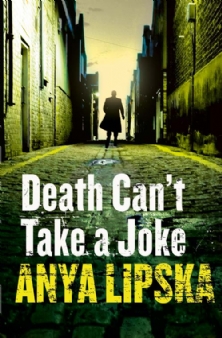You have no items in your cart. Want to get some nice things?
Go shopping Anya Lipska is a self-confessed “plastic Pole.” One of many exciting new novelists writing on Polish experience in Britain, Lipska worried about how she was going to make her work stand out from other British crime writers. Then she remembered her Polish husband. During the Polish Crime Night event at Belgravia Books earlier this year, Lipska recalled her writing process, “I hunted and hunted for a very long time – how can I make it different? How I can make it stand out? Then I thought, ‘Oh yes, I’ve got a Polish husband!’… This might come in useful! I live in the East End, where there are a huge amount of Poles, and I thought, ‘I’m interested in these people. Surely UK audiences will be too.’”
Anya Lipska is a self-confessed “plastic Pole.” One of many exciting new novelists writing on Polish experience in Britain, Lipska worried about how she was going to make her work stand out from other British crime writers. Then she remembered her Polish husband. During the Polish Crime Night event at Belgravia Books earlier this year, Lipska recalled her writing process, “I hunted and hunted for a very long time – how can I make it different? How I can make it stand out? Then I thought, ‘Oh yes, I’ve got a Polish husband!’… This might come in useful! I live in the East End, where there are a huge amount of Poles, and I thought, ‘I’m interested in these people. Surely UK audiences will be too.’”
‘So, what do you feel like eating?’ For a moment, he couldn’t understand why she was looking at him so blankly, before realising that he’d spoken to her in Polish. ‘Sorry,’ he said, scratching his ear. ‘Let me tell you what they have. Okay, I’m going to start with the kaszanka. That’s duck’s blood sausage fried with buckwheat.’
Her almost-comical look of horror advised him to move on.
Death Can’t Take a Joke, Lipska’s tight and intricately plotted second novel, returns to the characters introduced in her 2013 crime debut, Where the Devil Can’t Go: Janusz Kiszka, fixer for London’s Polish community, and Natalie Kershaw, a young and ambitious detective. DC Kershaw, on her last day of secondment to Docklands nick before transfer to the Walthamstow Murder Squad, finds herself at the wrong place at the wrong time when a man falls from one of the skyscrapers in Canary Wharf. Meanwhile, Kiszka’s old friend Jim Fulford, ex-Marine and Falklands veteran, now local gym proprietor, has been discovered stabbed to death on his own doorstep.
Walthamstow Murder Squad, meant to be a fresh start for Kershaw, fingers Kiszka as a suspect and the two come face-to-face in the interrogation room, with the young Detective Constable noting the fixer “was as welcome as a cockroach in the cornflakes.” When it transpires that the police do not have enough evidence to charge him, Kiszka begins his own search for the murderer in an effort to clear his name. He follows a mysterious Ukrainian woman, spotted placing flowers outside Jim’s house, and eventually ends up at dodgy business run by a Romanian outfit. Kershaw, meanwhile, discovers that the victim in the Docklands case is Polish – and that she has to ask Kiszka for help.
Lipska excels at the portraiture of her main characters and in sketching out Britain’s Polish community in fascinating detail, as well as addressing the impact of Polish immigration to the UK. Kiszka observes: “‘Back in the eighties I at least had a rarity value. English people wanted to talk to me about Kieslowski and Polanski.’ He puffed air through his lips – a dismissive sound. ‘Now they just want to know if I do loft conversions.’”
This is a strong, pacy, narrative with unexpected turns and discoveries that, for instance, take Kershaw and Kiszka to eastern Poland in connection with their investigation. Gripping events that endanger both of their lives make it an especially chilling read.
The thing that caught his attention was a curious scar running down the side of his face. Reaching from temple to jaw, it looked too wide to have been carved by a blade, and yet unusually regular for a burn.
There is much to enjoy in Death Can’t Take a Joke, especially the perceptive and funny dialogue – something I, as a Pole, found incredibly enjoyable and surprising, as we are not a nation known for our sense of humour. In particular, the Kiszka-Kershaw relationship, something only hinted at in Lipska’s first novel, is much better developed here. Death Can’t Take a Joke is a superb page-turner, suspenseful right through its final pages.

About A. M. Bakalar
A. M. Bakalar was born and raised in Poland. She lived in Germany, France, Sicily and Canada before she moved to the UK in 2004. Her first novel, Madame Mephisto, was among readers’ recommendations for the Guardian First Book Award. She is the first Polish woman to publish a novel in English since Poland joined the EU in 2004. A. M. Bakalar lives with her partner—a drum and bass musician—in London. She is currently at work on her second novel.





We are knowing that this is useful to us.